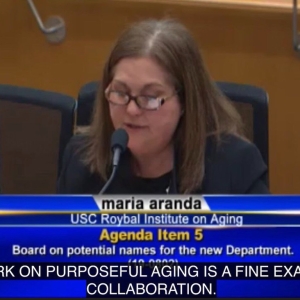Aranda Testifies on Making Los Angeles More Age Friendly
March 26, 2019 / by Vincent Lim- Research
María Aranda, executive director of the USC Edward R. Roybal Institute on Aging, gave expert testimony before the Los Angeles County Board of Supervisors during one of its standing meetings, as the board discussed approving a motion to bring about systemic change to create a more age-friendly Los Angeles.
Aranda, an associate professor at the USC Suzanne Dworak-Peck School of Social Work and a licensed clinical social worker with over 30 years of professional experience, spoke at a Feb. 5 meeting using her research and experiences working with older adults and their families in Los Angeles.
“Most adults and older adults living in the region are stay-put people—meaning they want to stay in this region, retire here,” Aranda said. “They’re not going anywhere else. They plan to retire along with family, friends and loved ones in this community.”
The motion, which was approved by the board at the meeting, starts the process of exploring the feasibility of creating a stand-alone county department dedicated solely to serving Los Angeles’ already large and rapidly growing older adult population.
The L.A. region is home to 1 in 4 of all of California’s older adults, and this population is projected to double between 2010 and 2030 from roughly 1.8 million to nearly 3.6 million.
“The population of our older adults is skyrocketing,” said Supervisor Janice Hahn, who co-sponsored the motion with Supervisor Sheila Kuehl. “I say ‘our’ because I’m in that group.”
The motion’s goal is to bring together services provided by the City of Los Angeles and Los Angeles County into one entity. The federal government, through the Area Agencies on Aging, currently provides funding for older adult services to both the city and the county separately. Los Angeles is the only region in the state with two separate jurisdictions for AAA funding.
This can sometimes lead to difficulties for L.A. residents because the city and county may not offer the same types of services, and eligibility requirements may be different. There are also logistical challenges with referrals.
Coordinating Service Delivery
At the meeting, Hahn discussed how various services available to older adults through different L.A. government departments are siloed from each other, even at the county level. For example, Hahn noted that In-Home Supportive Services is part of the Los Angeles County Department of Public Social Services, while the Office of Senior Health is part of the Los Angeles County Department of Public Health.
“We could use a little more coordination of our services,” Hahn said. “A county department dedicated to older adults would allow us to coordinate our work. It would give us the ability to be proactive rather than reactive in addressing this population’s needs.”
During her testimony before the board, Aranda emphasized this point along with the differences in needs of the population. She said there are two types of older adults in the region.
“One is the older adult that is faced with numerous cognitive, physical and emotional problems and challenges…The other group…are people that are vibrant, want to volunteer, continue working in the workforce in the region,” Aranda said. “What brings these two groups together is that they have very little awareness of the existing services that they are eligible for in the county.”
By approving the motion, the board sets the stage for a process involving the City of Los Angeles, the Los Angeles Department of Workforce Development, Aging and Community Services, and community stakeholders to bring about a system-wide reorganization of services in the hope of better serving Los Angeles’ current and future aging population.
Building for Change
A decade ago, the Board of Supervisors instructed the Los Angeles County CEO to report back with recommendations for integrating services for the region’s older adults to prepare for the coming demographic shift.
This mandate led to the development in 2016 of the Purposeful Aging Los Angeles (PALA) Initiative, a countywide, multi-year effort to unite public and private leaders, resources, ideas, and strategies to improve the lives of older adults and residents of Los Angeles of all ages.
Aranda chaired PALA’s data evaluation workgroup, which included scientists from USC, UCLA and California State University, Los Angeles. The group spearheaded data analysis for the Los Angeles region on eight liveability domains: outdoor spaces and buildings, transportation, housing, social participation, civic participation, employment, community and health services, and social inclusion.
PALA published the Age-Friendly Action Plan for the Los Angeles region that offered 34 recommendations to enhance age-friendliness in areas ranging from housing and transportation to emergency preparedness and resilience. Aranda, along with USC Roybal Institute Research Associate Professor Donald Lloyd and Assistant Director Iris Aguilar, contributed their knowledge to the report.
The Board of Supervisors approved the plan with its recommendations on Aug. 7, 2018. The motion approved Feb. 5 to evaluate the feasibility of consolidating services for older adults was built on this previous work.
“We want to be able to serve these residents and shape Los Angeles County into a place where they can not only live comfortably, but [also] thrive and continue to live the fullest life possible,” Hahn said.
To reference the work of our faculty online, we ask that you directly quote their work where possible and attribute it to "FACULTY NAME, a professor in the USC Suzanne Dworak-Peck School of Social Work” (LINK: https://dworakpeck.usc.edu)
